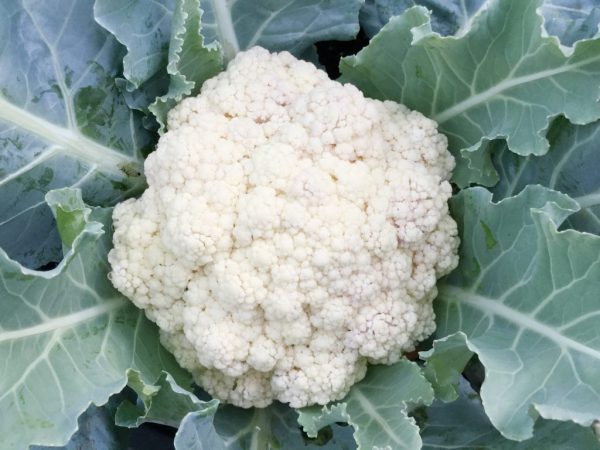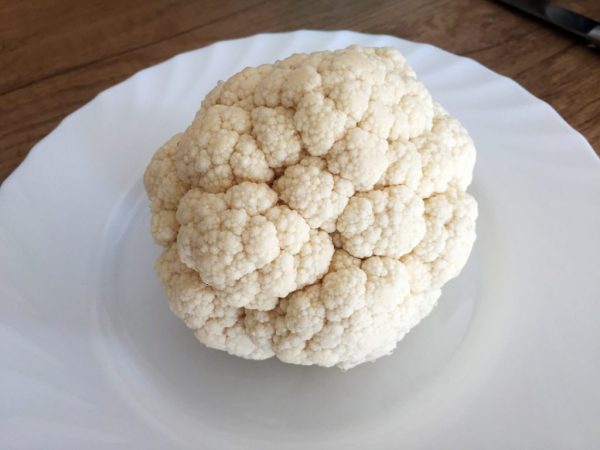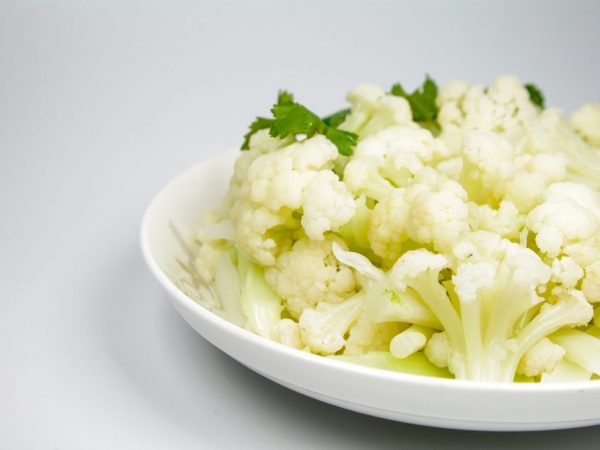Calorie content of cauliflower
Cauliflower is an annual crop with a lobe-shaped root system. It is used in cooking as a base or addition to a dish. The calorie content of cauliflower depends on the method of processing the product, as well as the variety and subspecies.

Calorie content of cauliflower
Composition and nutritional value
The calorie content of cauliflower per 100 g of product is 23.4 kilocalories. This is 1.56% of the RDA.
Nutritional value of cauliflower:
- proteins - 1.9 g;
- fats - 0.4 g;
- carbohydrates - 4.2 g;
- water - 95.4 g;
- dietary fiber - 2.2 g;
Vitamin Composition:
- vitamin A (RE);
- vitamin B1 (thiamine);
- vitamin B4 (choline);
- vitamin B9 (folate substances);
- vitamin B2 (riboflavin);
- vitamin B5 (pantetonic acid);
- vitamin B6 (pyridoxine);
- beta-carotene;
- vitamin PP (NE);
- lutein;
- vitamin C (ascorbic acid);
- vitamin K (phyloquinone);
- betaine;
- vitamin E (alphatocopherol).
Mineral composition
Macronutrients in cauliflower:
- potassium;
- phosphorus;
- magnesium;
- calcium;
- sodium.
The composition of trace elements:
- zinc;
- copper;
- fluorine;
- manganese;
- selenium.
The vegetable also contains digestible carbohydrates. Part of mono and disaccharides is 1.93 g. The low number of calories per 100 g of the product makes cabbage useful for weight loss. Also, its rich mineral composition allows it to be used as a substitute for vitamin complexes without the risk of obesity.
Cauliflower Acids

Cabbage is very useful
Essential amino acid composition:
- lysine;
- threonine;
- phenylalanine;
- arginine;
- leucine;
- valine;
- tryptophan.
The composition of nonessential amino acids:
- proline;
- alanine;
- glutamic acid;
- serine;
- cysterol;
- aspartic acid.
Fatty acid:
- omega 3;
- omega 6.
Saturated acids:
- palmatic acid;
- stearic acid.
Mono and polyunsaturated fatty acids:
- oleic acid;
- linolenic;
- linoleic.
Nutritional value of cabbage dishes
Calories of cooked cauliflower per 100 g of product:
- boiled - 28.7 kcal;
- fried - 123 kcal;
- steamed - 32.3 kcal;
- with chicken eggs - 55.32 kcal;
- in batter - 77.85 kcal;
- with sour cream - 53.45 kcal.
Nutritional value of boiled cauliflower:
- proteins - 1.83 g;
- fats - 0.28 g;
- carbohydrates - 3.73 g;
Fried vegetable nutritional value:
- proteins - 3.22 g;
- fats - 11.23 g;
- carbohydrates - 5.64 g.
Nutritional information for steamed cauliflower:
- proteins - 2.35 g;
- fats - 0.28 g;
- carbohydrates - 4.75 g.
Nutritional value of colored variety in batter (g):
- proteins - 5.32;
- fats - 4.54;
- carbohydrates - 4.33.

The nutritional value of cabbage depends on the cooking method
Nutritional value of cauliflower with sour cream (g):
- proteins - 2.54;
- fats - 6.654;
- carbohydrates - 4.65.
Nutritional value of colored variety with egg (g):
- proteins - 3.22;
- fats - 2.56;
- carbohydrates - 5.43.
Cauliflower in cooking
Low in calories and high in vitamins, this vegetable is one of the healthiest foods around.It does not lose its beneficial properties when baked, boiled or steamed. It is effective to cook a vegetable by stewing with the addition of lemon juice. This will preserve the color of the inflorescences.
It is forbidden to cook the colored variety in dishes made of iron or aluminum. This will cause a chemical reaction with the acids in the food, which will reduce the health of the vegetable.
Cauliflower with salt
The low calorie content of cauliflower opens up well when cooked with salt. This method increases the effect of vitamins B, C and K, and also improves the absorption of dietary fiber and sodium by the body.
Useful properties of cabbage with salt:
- Improving metabolism. Vitamins B6 and C9 act as enzymes in metabolic processes.
- Oxidative and regenerative effects. Fortified with salt, vitamin C improves the immune system and accelerates the absorption of trace elements from cabbage by the body. Also prevents gum disease and cracking of blood capillaries.
- Regulation of blood quality. Vitamin K prevents blood clotting and eliminates blood clots.
Cauliflower for weight loss
The low calorie content of cauliflower makes the product one of the most effective in losing weight. There is a diet that involves consuming vegetables as the basis of the diet. Monorative weight loss is effective, but extreme. Such diets are carried out in short courses.
Products that cabbage is combined with for weight loss:
- cucumbers;
- rice;
- buckwheat;
- watermelons.
The vegetable makes a good base for the menu, due to its low calorie content with a large amount of beneficial micronutrients. Also, the fruits contain folic acid, which normalizes carbohydrate metabolism and prevents the appearance of fatty deposits.
3 Day Cabbage Diet
For a three-day weight loss program on a colored variety, you need to harvest 5 kg of fruit. 1.5-1.7 kg are consumed per day. The product is boiled in salted water and divided into 3-4 portions, which are distributed evenly over a day. It is possible to lose 1.5-3 kg in 3 days.
Also, such a diet is carried out to switch to a constant intake of food with a low calorie content. After 3 days, it is better to switch to buckwheat and watermelon cereals, which are supplemented with fruits and vegetables.
Contraindications to the cabbage diet
A large amount of cauliflower is prohibited to use when:
- increased acidity of the stomach;
- intestinal cramps;
- acute form of ulcers;
- enterocolitis;
- gout;
- liver and kidney disease;
- high blood pressure.
Cauliflower is contraindicated in the postoperative period. Also, the product is forbidden to eat with individual intolerance.
Due to its high purine content, the vegetable causes uric acid stagnation, which can lead to gout. Also, the product negatively affects the thyroid gland, therefore it is forbidden to eat a lot of vegetables for disorders of this organ.
Conclusion
The low calorie content of cauliflower per 100 g and a large number of beneficial properties allows the product to be used for auxiliary treatment. It is able to replace vitamin and mineral complexes without the risk of weight gain.
Also, the vegetable is allowed to be consumed by diabetics. Its glycemic index is 15.


